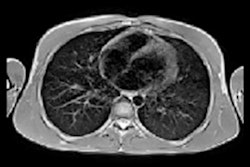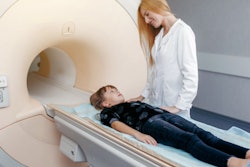
MONTREAL - Developing alternatives to using anesthesia during pediatric MRI scans can be as easy as child's play, according to a poster presentation at the Society for MR Radiographers & Technologists (SMRT) annual meeting.
Boston Children's Hospital got creative to better prepare children for MRI scans, developing an ocean exploration-themed game designed to prepare children for their scans without the use of anesthesia or a mock MRI scanner. In a small pilot study, all the children who participated in the game were able to complete their scans.
Dark, noisy, and very scary
"An MRI scanner is dark, noisy, and very scary for children," said Kristina Pelkola, chief research MRI technologist at Boston Children's Hospital, who led a research team that included Dr. Robert Robertson; Simon Warfield, PhD; Onur Afacan, PhD; and Kellyn Mahan.
The intimidating environment of the MRI scanner -- as well as the natural tendency of children to fidget -- can cause children to move, which produces motion artifacts on MRI images. To limit motion, many MRI facilities have resorted to sedation or anesthesia, but these can lead to problems of their own.
Anesthesia can produce motion artifacts from breathing or uncontrollable twitching, Pelkola noted. Anesthesia also comes with potential health risks such as respiratory distress, aspiration, and cardiac arrest, which have been documented to occur in more than 20% of children. Emergence delirium and nighttime crying are additional side effects associated with anesthesia exposure in children.
Mock MRI scanners provide an alternate solution to prepare children for scans without the use of anesthesia. But a life-size mock MRI scanner may not be suitable for every pediatric facility because of the cost, maintenance, and amount of space needed to house it, according to Pelkola.
"In our case, there is no room to place it," she said, noting that Boston Children's does not house its mock MRI scanner at the main hospital site.
Pelkola and colleagues sought to find a creative alternative that would avoid the need for anesthesia in pediatric patients who need MRI scans without relying on the mock MRI scanner. The literature suggested that play tunnels have been used to simulate the MRI scanner environment, so Pelkola and colleagues designed an MRI preparation game structured around play tunnels.
The 'statue game'
In the game, children are asked to climb into a fish-themed play tunnel and play the "statue game," in which the child remains still while audio clips of MRI sequences are played for three to five minutes. The goal is to desensitize the child to the MRI scanner's gradient noises while familiarizing the child with the claustrophobic environment of an MRI tunnel.
"The kids would climb into the play tunnel and would see it as play time," Pelkola said. "We played the statue game, so they were instructed to stay very still. The child sees if he or she moves, the tunnel will move."
The statue game makes it possible to acquire MRI images without much difficulty, and it makes the procedure less daunting for children and less stressful for parents, Pelkola explained.
Parents can bring an item, such as a stuffed animal, to provide a child with a sense of security, and they can stand at the foot of the tunnel to also bolster the child's sense of security, Pelkola noted.
After a practice run, children are asked to change into hospital gowns, which, in keeping with the nautical theme, are called "scuba suits." Upon entering the scan room, the child sees ocean-life themes consistent with the play tunnel, and the MRI scanner itself is disguised as a lifelike sandcastle. The child is offered video goggles and a movie for distraction and to muffle the gradient noises emitted from the MRI scanner.
The game was tested with a total of 10 children between ages 4 and 7 who were randomly selected to undergo a single MRI examination of sites like the head and lumbar spine, Pelkola said.
"Our success was 100%," with none of the children having to come back for repeat scans, she noted. "It is ideal if we can avoid using anesthesia in children. It is costly, and it can delay scheduling of an MRI. There is usually a backlog in anesthesia appointments."




















